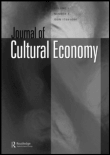
Journal of Cultural Economy
Scope & Guideline
Transforming Perspectives on Culture and Economy
Introduction
Aims and Scopes
- Cultural Economics:
The journal investigates how cultural practices, values, and narratives influence economic behavior and market dynamics. It seeks to understand the economic implications of cultural production and consumption. - Interdisciplinary Methodologies:
Utilizing a range of methodologies, including qualitative research, ethnography, and critical theoretical frameworks, the journal encourages innovative approaches to studying the cultural dimensions of economic life. - Global Perspectives:
The Journal emphasizes a global perspective, examining economic and cultural issues across different geographical contexts, particularly in the Global South, to highlight diverse economic practices and cultural expressions. - Political Economy:
The journal explores the political dimensions of economic processes, including how power relations shape market practices and cultural understandings of value. - Digital and Technological Influences:
A focus on how digital technologies and platforms transform economic practices and cultural consumption, addressing themes such as fintech, platform economies, and the impact of algorithms on social relations.
Trending and Emerging
- Moral Economies:
Recent publications emphasize the concept of moral economies, exploring how ethical considerations and social values shape economic practices, particularly in contexts of scarcity and crisis. - Climate and Environmental Issues:
There is a growing focus on the intersection of economy and environment, particularly how financial practices relate to climate risk, sustainability, and the commodification of environmental resources. - Digital Economies and Platforms:
The rise of digital platforms and their impact on economic practices is a significant trend, with increasing attention on how algorithms, fintech, and digital labor shape cultural and economic interactions. - Consumer Activism and Resistance:
Emerging themes include consumer activism and resistance, reflecting a heightened awareness of the political implications of consumption and the role of consumers in challenging economic injustices. - Global South Perspectives:
An increasing number of articles are focusing on economic practices and cultural narratives from the Global South, emphasizing the importance of diverse perspectives in understanding global economic phenomena.
Declining or Waning
- Traditional Economic Models:
There is a noticeable decline in papers focusing on traditional economic models and theories, suggesting a shift towards more critical and culturally nuanced analyses of economic phenomena. - Static Cultural Studies:
The journal seems to be moving away from static analyses of culture that do not engage with economic processes, signaling a preference for dynamic interactions between culture and economy. - Localized Case Studies:
Fewer localized case studies are being published, indicating a potential shift towards broader comparative analyses that engage with global trends rather than focusing on specific local contexts. - Historical Economic Narratives:
The focus on historical perspectives of economic practices is diminishing, possibly as contemporary issues take precedence in the journal's discourse. - Exclusively Quantitative Approaches:
There is a declining interest in purely quantitative approaches, as the journal increasingly prioritizes qualitative insights that capture the complexities of cultural economies.
Similar Journals
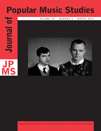
Journal of Popular Music Studies
Engaging in the Dialogue of Sound and SocietyJournal of Popular Music Studies, published by University of California Press, is a preeminent academic journal dedicated to the exploration and analysis of popular music and its cultural implications. With an ISSN of 1524-2226 and an E-ISSN of 1533-1598, this journal encompasses a range of methodologies, encouraging interdisciplinary dialogue across fields such as musicology, cultural studies, and sociology. Since its inception in 1988, it has provided a platform for critical examination of popular music through various lenses, contributing significantly to the understanding of music in contemporary society. The journal maintains a robust reputation, currently holding a Q2 ranking in the Music category of Scopus, positioning itself within the 58th percentile among its peers. As an invaluable resource for researchers, professionals, and students alike, the Journal of Popular Music Studies remains committed to fostering innovative scholarship and discussions that illuminate the impact of popular music on social and cultural landscapes.

World Review of Political Economy
Engaging Minds Across Disciplines for a Better TomorrowWorld Review of Political Economy, a distinguished publication by PLUTO JOURNALS, emerges as a vital resource in the interdisciplinary landscape of political economy, sociology, and international relations. Initiated as an open access journal in 2021, it caters to scholars and practitioners by facilitating the immediate and unrestricted dissemination of research findings. With a significant presence in multiple quarters—ranking Q2 in the fields of Economics, Econometrics and Finance, Political Science, and Sociology—the journal reflects its commitment to addressing complex global issues through rigorous analysis and discourse. Nestled in the United Kingdom, it benefits from a rich academic environment, further amplified by its indexing in Scopus, which places it among the influential voices in social sciences. By encouraging innovative approaches and robust discussions, the journal aims not only to inform but also to inspire action among researchers, professionals, and students, thereby contributing meaningfully to the evolving field of political economy.
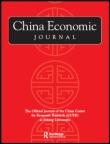
China Economic Journal
Unpacking the Intersections of Economics, Culture, and SocietyChina Economic Journal, published by Routledge Journals, Taylor & Francis Ltd, serves as a premier platform for scholarly discourse in the fields of Cultural Studies, Economics, and Sociology, with a notable impact factor reflecting its esteemed reputation. Since its inception in 2010, the journal has dedicated itself to advancing knowledge and understanding of the dynamic economic landscape of China, addressing critical issues that intersect with culture, policy, and society. With a strong quarterly ranking in prestigious categories — Q1 status in both Cultural Studies and Economics, as well as a reputable position in Sociology and Political Science — it stands among the top-tier journals globally. Researchers, professionals, and students alike benefit from its rigorous peer-reviewed articles that contribute significantly to both academic and practical insights. Although the journal is not open access, it remains a vital resource for those seeking to engage with contemporary discourse on China's economic trajectory and its implications in the global context.
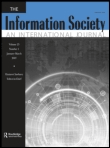
INFORMATION SOCIETY
Advancing Knowledge at the Intersection of Culture and TechnologyINFORMATION SOCIETY, published by Taylor & Francis Inc, stands at the forefront of interdisciplinary inquiry, bridging the realms of cultural studies, information systems, and political science since its inception in 1981. With a commendable impact factor and recognized as a Q1 journal in multiple categories, including Cultural Studies and Management Information Systems, it serves as a pivotal platform for researchers, professionals, and students seeking insights into the ever-evolving dynamics of information in society. The journal, indexed by Scopus and ranked highly in various disciplines, not only highlights key theoretical developments but also addresses applied practices in information management within cultural and political contexts. While access is subscription-based, the journal’s impact and relevance ensure it remains essential reading for those engaged in the critical exploration of information's role in contemporary and future societies.
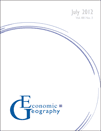
ECONOMIC GEOGRAPHY
Mapping Economic Trends through Geographical LensesECONOMIC GEOGRAPHY, published by Taylor & Francis Ltd, is a premier journal in the fields of Economics and Geography, acclaimed for its rigorous exploration of the spatial dynamics of economic processes. With an ISSN of 0013-0095 and E-ISSN of 1944-8287, this journal boasts a remarkable standing reflected in its 2023 Q1 category rankings in both Economics and Econometrics and Geography, Planning and Development. Positioned within the top percentile of its categories in Scopus rankings, it is a vital resource for researchers, professionals, and students seeking to understand the complex interplay between economic activities and geographical contexts. Published in the United Kingdom, the journal maintains a rich archive dating back to its inception in 1972, making it a significant repository of knowledge for those examining economic geography across decades. While not an open-access journal, its in-depth articles provide crucial insights into pressing economic issues and contribute to advancing scholarly discourse in the discipline.

CURRENT ANTHROPOLOGY
Pioneering Discussions in Cultural ResearchCURRENT ANTHROPOLOGY, published by the esteemed University of Chicago Press, stands as a premier journal in the fields of anthropology and archaeology, with an impressive impact factor that signifies its relevance and authority in the academic community. With both print (ISSN: 0011-3204) and digital formats (E-ISSN: 1537-5382), this journal provides a platform for groundbreaking research, theoretical advancements, and critical discussions that shape our understanding of human cultures and societies. Since its inception in 1962, CURRENT ANTHROPOLOGY has continually pushed the boundaries of knowledge and inquiry, earning a prestigious Q1 ranking in 2023 across multiple categories, including Social Sciences and Archaeology. Researchers and professionals alike rely on this journal not only for its rigorous peer-reviewed articles but also for its commitment to interdisciplinary approaches and innovative methodologies. While not currently offering open access, CURRENT ANTHROPOLOGY remains an essential resource for students and scholars eager to stay abreast of the latest developments in anthropological research.

TIJDSCHRIFT VOOR ECONOMISCHE EN SOCIALE GEOGRAFIE
Shaping Academic Discourse in Economics and GeographyTIJDSCHRIFT VOOR ECONOMISCHE EN SOCIALE GEOGRAFIE, an esteemed journal published by WILEY, provides a premier platform for the dissemination of cutting-edge research within the fields of economics and social geography. With an ISSN of 0040-747X and an E-ISSN of 1467-9663, this journal has established itself as a pivotal resource, exhibiting a remarkable Q1 ranking in both Economics and Econometrics as well as Geography, Planning and Development for 2023. Notably, it is positioned in the 95th percentile among 821 journals in its category of Social Sciences, and ranks 46th among 716 in Economics and Econometrics, underscoring its influential role in shaping academic discourse. The journal, which has been in publication since 1967 and is anticipated to run through 2024, invites contributions that explore the intricate interplay between economic phenomena and social geospatial dynamics. Researchers, professionals, and students are encouraged to engage with its findings, which are crucial for understanding contemporary socio-economic challenges and innovations on a global scale.
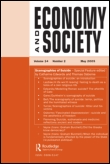
ECONOMY AND SOCIETY
Exploring the Nexus of Economics and SocietyECONOMY AND SOCIETY, published by Routledge Journals, Taylor & Francis Ltd, is a premier academic journal that bridges the realms of economics and social sciences, making significant contributions to interdisciplinary scholarship. Established in 1972 and ongoing through 2024, this journal holds an esteemed Q1 ranking in multiple categories, including Business and International Management, Economics and Econometrics, and History, underscoring its impact within academia. With Scopus rankings placing it in the top percentiles across various fields, ECONOMY AND SOCIETY serves as an essential platform for researchers, professionals, and students to explore critical topics such as economic behavior, societal structures, and historical contexts. Although it does not offer Open Access, its rigorous peer-reviewed articles are instrumental in influencing policy and fostering scholarly dialogue. Explore the full range of issues and contribute to this vibrant academic community focused on the intersection of economy and society.
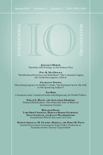
INTERNATIONAL ORGANIZATION
Illuminating the Pathways of International CooperationINTERNATIONAL ORGANIZATION, a prestigious journal published by Cambridge University Press, stands at the forefront of political science, law, organizational behavior, and sociology. Since its inception in 1947, this influential journal has fostered critical dialogue and research among scholars and practitioners, maintaining an impressive impact in the field, as evidenced by its Q1 rankings across multiple disciplines in 2023. With a robust Scopus rank placing it in the top percentiles of its categories, INTERNATIONAL ORGANIZATION serves as an essential resource for those engaged in understanding complex global issues, institutional frameworks, and human resource dynamics. Although it does not offer Open Access, it provides extensive insights that are invaluable for students, researchers, and professionals dedicated to advancing knowledge in international relations and organizational studies. For those looking to contribute to impactful scholarship, submissions to this journal provide a unique opportunity to influence the evolving landscape of these critical fields.
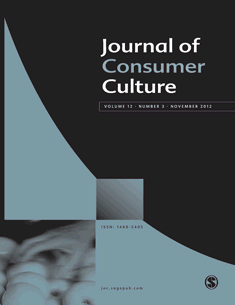
Journal of Consumer Culture
Decoding the Interplay of Culture and CommerceJournal of Consumer Culture, published by SAGE Publications Ltd in the United Kingdom, is an essential resource for scholars and practitioners interested in the complex interplay between consumer behavior and cultural contexts. Established in 2001 and continuing to 2024, this journal holds a distinguished position within multiple disciplines, evidenced by its Q1 rankings across diverse categories such as Arts and Humanities, Business and International Management, Economics, and Social Psychology for 2023. With an impressive Scopus ranking standing within the top tier of respective fields, it maintains a commitment to generating insightful discourse on consumer practices informed by sociocultural dynamics. Although it does not currently offer open access, its rigorous peer-reviewed articles promise significant contributions to understanding contemporary consumer phenomena. Researchers, professionals, and students alike will find valuable perspectives that cater to a broad range of interests in the ever-evolving landscape of consumer culture.